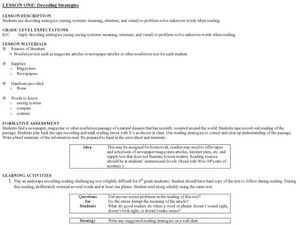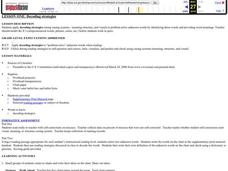Meadows Center for Preventing Educational Risk, University of Texas at Austin
Lesson 3 - Consonant Digraphs
Words such as witch, whack, and wish often cause beginning readers to struggle. The third installments in the Word Recognition and Fluency series of 17, covers consonant digraphs. Activities guide learners through the identification and...
Meadows Center for Preventing Educational Risk, University of Texas at Austin
Lesson 17 - Adding Suffixes That Change Base Words' Finally to I
If it ends in a y, change the y to i when adding a suffix like -ness, -ly, or fy. The final lesson in the Word Recognition and Fluency series of 17 explains when to change the final letter in a base word to i before adding a suffix....
Meadows Center for Preventing Educational Risk, University of Texas at Austin
Lesson 9 - Contractions
Is it do'nt or don't? How about doesn't or does'nt? A instructional activity on contractions helps learners identify, form, and use contractions. Components within the plan include direct instruction on decoding and encoding...
Meadows Center for Preventing Educational Risk, University of Texas at Austin
Lesson 15 - Soft G and Soft C
The names Cindy and Carrie start with the same letter, but have very different sounds. The 15th of 17 word recognition lessons focuses on the soft C sound found in Cindy and the soft G sound found in Gene. Direct instruction starts with...
Curated OER
Daily Lesson Plan for a Struggling Reader
Strategy-based programs that are executed with consistency are the best for achieving growth in any learner with a learning disability. Here is a seven-step lesson plan that is highly structured and is intended to help learners with...
Curated OER
Lesson One: Decoding Strategies
Review decoding strategies to read a chosen text. Readers tape themselves reading out loud, listen to the recording, and mark where they have misread words or phrases. They then discuss which words were misread and review how to correct...
Meadows Center for Preventing Educational Risk, University of Texas at Austin
Lesson 13 - Multisyllabic Word Reading
One- and two-syllable words may flow from the tongue with ease, but longer words, such as department and volcano, feel like tongue twisters. Scaffolded instruction explains how to break words into their individual syllables, and then...
Curated OER
Applying Decoding, Vocabulary, and During Reading Strategies
Apply reading strategies to boost phonemic awareness. While reading a provided informational text, learners use decoding, vocabulary, and a graphic organizer to strengthen their overall reading ability. Handouts and the reading passage...
Curated OER
Decoding Strategies
Young readers apply decoding strategies to identify unknown words. In this reading lesson, they read the Preamble and practice using decoding strategies. Small groups rotate to five charts that have questions regarding the Constitution...
Curated OER
Lights, Camera, and Action!
These activities center around acting out a play to help create fluent readers who use expression and emotion. As readers work through the play the first time, they also practice decoding strategies. In small groups of four, they then...
Curated OER
Word Origins
Understanding a word's etymology can really help with decoding and building vocabulary skills. Readers compare and contrast words of similar origins but with different difficulty levels. They focus on prefixes, suffixes, and affixes....
BBC
The Cream Cake Mystery - Seeing Patterns
A great language arts lesson designed for emerging readers awaits your class. Rhyming words are the focus. Learners play an interactive learning game on the computer that helps them to understand words that rhyme. As with all of these...
Curated OER
Word Review Card Activity
Pupils play a card game where they match the meaning of the word to the word or its prefix/suffix. They listen for the teacher to call out the definition and, with two players facing off, the first one to slap the correct card wins! Kids...
Curated OER
Alphabet Organizer
Students practice organizing their vocabulary words in an online organizer tool. In this vocabulary lesson, students read a text and take notes. Additionally, students organize their vocabulary words into an online "Alphabet Organizer"...
Curated OER
Vocabulary through Text
Explore word meanings. Sixth graders identify examples of words with affixes while listening to the story Paul Bunyan by Steven Kellogg. They participate in the game "Pass the Parts" and practice separating given words into their root...
Curated OER
Homophones
Young scholars draw a sketch of each homophone and write sentences with homophones in them. In this homophones lesson plan, students also match homophones in a picture form.
Curated OER
Comparing Fiction and Nonfiction
Fifth graders compare and contrast an informational article with a fictional story. They read the story "The Contest" as a class, and discuss the different types of literature genres. Next, they complete a vocabulary worksheet and a...


















